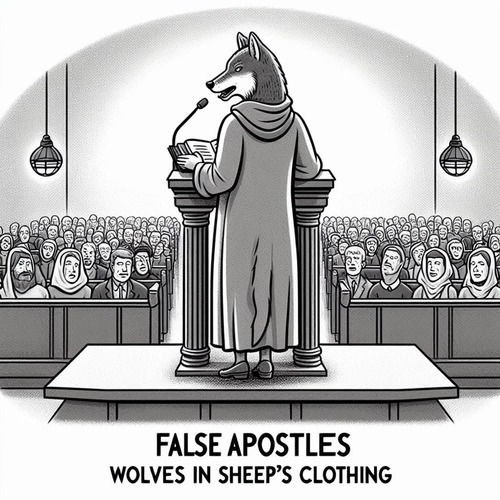Doesn’t God Cause People to Do Evil?
**Editor’s Note: This post is part of our series, ‘Satan’s Lies: Common Deceptions in the Church Today’…
“If God controls everything, doesn’t that make Him responsible for evil?” This accusation has echoed through centuries, from philosophy classrooms to hospital waiting rooms. It represents one of Satan’s most effective lies against God’s character—a deception so subtle even believers often find themselves ensnared by its logic. Today, let’s examine what Scripture actually teaches about God’s sovereignty and evil, exposing the distortion that threatens to undermine our faith.
THE LIE DEFINED
The false premise behind this deception is straightforward: since God has absolute sovereignty over all things, He must directly cause all evil. The logical trap follows naturally—if God ordains all things, and God ordains sin, then God must be evil. This lie manifests in various forms throughout the church today. Prosperity theology uses it to suggest God directly caused your suffering as punishment. Fatalistic determinism strips away human responsibility entirely. Most dangerously, it becomes a weapon against God’s goodness during our darkest trials.
The real target of Satan’s lie isn’t just our theology—it’s our trust in God’s perfect character. Satan knows if he can make us question God’s true goodness, he can destroy the foundation of our relationship with our heavenly Father.
THE REFORMED DISTINCTION: DECREE VS. CAUSATION
Reformed theology makes a crucial distinction Satan desperately wants us to miss. Yes, God ordains whatsoever comes to pass (Ephesians 1:11), as the Westminster Confession beautifully states. But ordaining something isn’t the same as directly causing it. God works as the primary cause through secondary causes, while we remain true agents of our choices. His eternal decree includes not just the ends, but also the means by which those ends come about.
Scripture provides powerful examples of this principle. When Joseph’s brothers sold him into slavery, they acted from jealous, evil hearts. Yet Joseph could later declare, “You meant it for evil, but God meant it for good” (Genesis 50:20). God’s sovereign plan and their sinful choice worked together without making God the author of their sin.
The crucifixion presents the ultimate example. Acts 2:23 tells us Jesus was “delivered up according to the definite plan and foreknowledge of God,” yet Acts 4:27-28 holds Herod, Pilate, and the crowds fully accountable for their wicked actions. God’s eternal plan encompassed their sin without causing their sin.
Consider also how God used Assyria as His rod of judgement against Israel (Isaiah 10:5-15). God directed their actions for His purposes, yet held them fully accountable for their brutal motives and pride. They acted according to their own sinful nature, fulfilling God’s decree without making God responsible for their wickedness.
The key principle is this: God ordains that sinful people act according to their sinful nature, but He is not the efficient cause of their sin. Think of it like an author who writes characters making genuine choices within a predetermined plot. The characters’ decisions are real and flow from their nature, even though the author has planned the story’s outcome.
BIBLICAL FOUNDATION FOR GOD’S GOODNESS
Scripture’s testimony to God’s perfect nature provides our unshakeable foundation in answering this lie:
God’s Perfect Nature:
- “God cannot be tempted by evil, nor does He tempt anyone” (James 1:13). This verse definitively removes God from any direct involvement in causing sin or evil. His nature is so perfectly holy that evil cannot even approach Him as a temptation, much less originate from Him.
- “Far be it from God to do wickedness” (Job 34:10). Even in Job’s extreme suffering, Elihu declares it impossible for God to act wickedly. God’s character makes evil actions as impossible as darkness emanating from the sun.
- “God is light; in Him is no darkness at all” (1 John 1:5). This isn’t merely about God’s knowledge, but His moral perfection. Darkness and light cannot coexist—evil simply has no place in God’s nature.
The Source of Evil:
- Sin entered through Adam’s free choice (Romans 5:12). Evil entered God’s perfect creation through human rebellion, not divine decree. Adam’s choice was genuine, flowing from his God-given freedom, yet it fulfilled God’s eternal plan without making God responsible.
- Evil comes from the human heart (Mark 7:21-23). Jesus locates the source of evil within fallen human nature itself. Our sin flows from our own corrupted hearts, not from external divine compulsion.
- Satan as the tempter and accuser. Scripture consistently presents Satan as the one who tempts and accuses, never God. The very question “Doesn’t God cause evil?” echoes Satan’s voice, not the Spirit’s.
God’s Relationship to Evil:
- He permits it for His purposes. God’s sovereignty means even evil cannot operate outside His ultimate control, yet permission is not causation. A judge who permits a trial to proceed doesn’t cause the crime.
- He limits it by His providence. Just as He set boundaries for Job’s testing, God’s sovereignty restrains evil within His appointed limits. Satan can only go as far as God allows.
- He overrules it for good (Romans 8:28). God’s promise isn’t that all things are good, but that He works all things—even evil—together for the good of those who love Him.
WHY SATAN PROMOTES THIS LIE
Understanding Satan’s motivation helps us recognise and resist this deception:
- It Attacks God’s Character: This lie strikes at the heart of who God is, making people question His goodness and trustworthiness. If God causes evil, how can we call Him good? Satan knows that faith cannot survive where God’s character is compromised.
- It Destroys Worship: How can you love and worship a God who directly causes your suffering? This lie transforms trials from opportunities to trust God into reasons to resent Him, poisoning the well of worship at its source.
- It Eliminates Personal Responsibility: “God made me do it” becomes the ultimate excuse, removing all accountability for sin. This destroys genuine repentance and keeps people trapped in cycles of guilt and blame rather than experiencing God’s forgiveness.
- It Creates Theological Confusion: The lie also forces believers into false choices—either embrace hyper-Calvinism (God causes sin) or abandon divine sovereignty entirely. Satan loves creating theological chaos that divides the church and weakens our confidence in Scripture.
- It Breeds Resentment: Instead of drawing us closer to God in trials, this lie turns suffering into evidence against God’s love. It transforms our heavenly Father from our refuge into our accuser, exactly what Satan desires.
- It Follows the Historical Pattern: This is the same lie Satan used in Eden—”Has God really said?”—questioning God’s motives and truthfulness. The serpent’s strategy hasn’t changed: make people doubt God’s good intentions toward them.
PRACTICAL APPLICATION AND CONCLUSION
How do we live in light of this truth? In times of suffering, we must trust God’s good purposes even when we cannot see them, knowing His sovereignty guarantees that our trials serve His perfect plan. When facing temptation, we take full responsibility for our choices rather than blaming God for our circumstances or struggles.
Theologically, we must hold both God’s absolute sovereignty and genuine human responsibility without compromise, refusing the false choice between them. In our witness to the world, we boldly defend God’s character against this ancient slander, showing how His sovereignty actually guarantees His goodness rather than threatening it.
The final truth is this: God’s sovereignty isn’t a threat to His goodness—it’s the guarantee that good will ultimately triumph over evil. Because God is both perfectly sovereign and perfectly good, we can rest assured that His purposes will prevail and His character will be vindicated.
DOESN’T GOD CAUSE PEOPLE TO DO EVIL? RELATED FAQs
How do Arminians and Molinists typically respond to this question? Arminians typically argue God limits His sovereignty through libertarian free will—that humanity possesses ultimate self-determination, so God doesn’t decree evil acts but merely permits them. Molinists add middle knowledge (scientia media), claiming God knows what free creatures would do in any circumstance and actualises worlds accordingly. Both systems attempt to preserve God’s goodness by limiting His sovereignty over sinful choices. However, Scripture consistently affirms God’s absolute sovereignty over all events, including human decisions (Proverbs 21:1, Daniel 4:35), making these limitations unbiblical compromises.
- What’s the difference between God being the “author” of sin versus ordaining it? Reformed theology distinguishes between authorship and ordination based on efficient versus ultimate causation. God as “author” would mean He directly causes sin from His own nature, making Him morally culpable—this is impossible given His perfect holiness (Habakkuk 1:13). However, God ordains sin by decreeing that sinful creatures act according to their fallen nature for His purposes. John Frame explains God is the ultimate cause (decree) without being the efficient cause (direct action). Westminster Confession 3.1 carefully states God ordains “whatsoever comes to pass” while 5.4 affirms this occurs “without violence” to creature’s wills.
- If God hardens hearts like Pharaoh’s, doesn’t that make Him cause sin? God’s hardening of hearts works through secondary means, not by injecting evil into pure hearts. Romans 9:17-18 and Exodus passages show God hardening Pharaoh’s already rebellious heart through circumstances and confrontation with truth. John Piper explains God’s hardening is divine withdrawal of restraining grace, allowing natural human rebellion to manifest fully. Paul Helm adds God hardens by presenting truth that proud hearts naturally reject. Scripture shows Pharaoh hardening his own heart first (Exodus 8:15, 32), then God judicially confirming that hardness. This demonstrates God working through, not against, human moral agency.
How can God command what He has decreed won’t happen? This apparent contradiction dissolves when we understand God’s revealed will versus His decretive will. God’s commands reveal His moral standards and what He approves, while His decrees accomplish His ultimate purposes through all means, including human disobedience. RC Sproul illustrates this with a parent who decrees their child will learn obedience through discipline, while still commanding obedience. Scripture supports this distinction—God commanded Pharaoh to let Israel go while decreeing his refusal for greater glory (Romans 9:17). God’s commands create genuine moral obligations regardless of His eternal decree, making human disobedience truly culpable.
- What about 1 Chronicles 21:1 versus 2 Samuel 24:1—did God or Satan incite David to sin? This apparent contradiction actually illustrates the Reformed principle perfectly. 2 Samuel 24:1 says “the anger of the Lord was kindled against Israel, and he incited David against them,” while 1 Chronicles 21:1 states “Satan stood against Israel and incited David.” Both are true—God’s sovereign decree worked through Satan’s temptation. Contemporary Reformed scholar Kevin DeYoung explains that God used Satan as His instrument of judgement while Satan acted from his own evil motives. This demonstrates how God’s decree includes secondary causes without making Him directly responsible for the sin. Satan tempted David, David chose to sin, yet God’s purposes were accomplished—each agent acting according to their nature within God’s sovereign plan.
- How do we avoid fatalism if God has decreed all things? Reformed theology avoids fatalism by maintaining God’s decree includes means as well as ends. Unlike fatalistic determinism, which makes human choices irrelevant, Reformed doctrine affirms that our prayers, efforts, and decisions are the very means God has ordained to accomplish His purposes. John Calvin taught we should act vigorously while trusting sovereignly. Modern Reformed scholars like DA Carson emphasise God’s sovereignty doesn’t eliminate secondary causes but establishes them. We pray because prayer is effective (James 5:16), we evangelize because God saves through preaching (Romans 10:14), and we make moral choices because they matter within God’s plan. The decree doesn’t bypass human agency but secures it.
Doesn’t it lead to moral license if God has decreed our sins? This objection misunderstands both human psychology and Reformed doctrine. Knowledge of God’s decree doesn’t diminish moral responsibility because we don’t know His specific decrees regarding our future choices—we still face genuine decisions with real consequences. Westminster Confession 3.8 explicitly addresses this, stating that the doctrine of predestination should humble and encourage believers, not lead to carelessness. Sinclair Ferguson points out that true understanding of God’s sovereignty increases holiness by showing us our complete dependence on grace. Moreover, if God has decreed someone’s sanctification, He has also decreed the means—conviction of sin, repentance, and growth in holiness. Those who use sovereignty as excuse for sin demonstrate they don’t truly understand or embrace the doctrine.
DOESN’T GOD CAUSE PEOPLE TO DO EVIL? OUR RELATED POSTS
Editor's Pick

Why Do People Hate the Doctrine of Election?
…WHEN THEY REALLY SHOULDN’T Few Bible doctrines provoke stronger reactions than election. The idea that God chose some for salvation [...]

The Doctrine of Providence: Does God Really Govern All Things?
You’re sitting in the doctor’s office when the diagnosis lands like a thunderclap. Your mind races: Why this? Why now? [...]

No Decay, No Defeat: What It Means That Christ’s Body Saw No Corruption
On the Day of Pentecost, Peter stood before thousands and made a startling claim: David's body decayed in the tomb, [...]
SUPPORT US:
Feel the Holy Spirit's gentle nudge to partner with us?
Donate Online:
Account Name: TRUTHS TO DIE FOR FOUNDATION
Account Number: 10243565459
Bank IFSC: IDFB0043391
Bank Name: IDFC FIRST BANK






